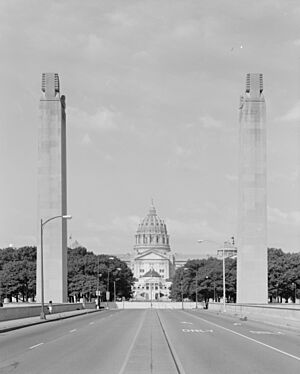Pennsylvania State Capitol Complex facts for kids
|
Pennsylvania State Capitol Complex
|
|
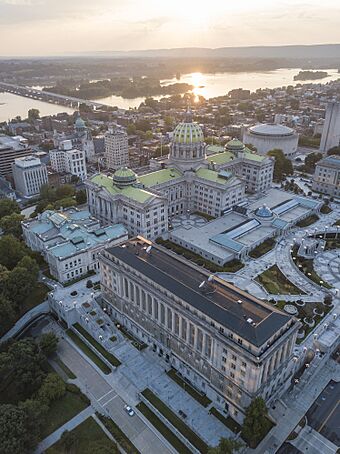
East portal of the Pennsylvania State Capitol at sunset with Speaker K. Leroy Irvis Office Building in front
|
|
| Location | Third, Walnut, Seventh and North Sts., Harrisburg, Pennsylvania, United States |
|---|---|
| Area | 48 acres (19 ha) |
| Built | 1902 |
| Architect | Brunner, Arnold; Huston, Joseph M. |
| Architectural style | Renaissance, Italian Renaissance |
| NRHP reference No. | 77001162 (original) 13000287 (increase) |
Quick facts for kids Significant dates |
|
| Added to NRHP | September 14, 1977 |
| Boundary increase | February 27, 2013 |
| Designated NHLD | September 20, 2006 |
The Pennsylvania State Capitol Complex is a group of important government buildings in Harrisburg, Pennsylvania. It covers more than 50 acres (about 20 hectares) in downtown Harrisburg. This area includes the main Pennsylvania State Capitol building, a beautiful park with monuments, and other government offices. It's a special place because it shows a great example of the "City Beautiful movement" in how it was designed. This movement aimed to make cities more beautiful and orderly with grand buildings and green spaces.
Contents
Exploring the Capitol Complex
The Pennsylvania State Capitol Complex is right in the middle of downtown Harrisburg. It's just a few blocks from the Susquehanna River.
The Main Capitol Building
The most important building here is the Pennsylvania State Capitol. It was built between 1902 and 1906. The capitol is famous for its grand design and amazing artwork inside. It's a great example of a style called Beaux Arts architecture, which means it's very fancy and detailed.
Other Important Buildings
Next to the capitol on the east side is the East Wing. This part was added in 1987 to make the building bigger. On either side of the East Wing are the North and South Office Buildings. These were built in the 1920s. They are made of Indiana limestone and have a classic look.
South of the Capitol is the Ryan Office Building. This is the oldest building in the complex, finished in 1894. There's a curved path between these buildings with a fountain in the middle.
Across Commonwealth Avenue, you'll find more buildings like the Forum and the Finance Building. These also use limestone and have a classic design. In between them is the Soldiers' and Sailors' Memorial Grove. This is a park with many statues and monuments. The complex even reaches across North Street to include the State Museum of Pennsylvania and the Department of Transportation building.
Keeping the Complex Safe
The entire complex is protected by the Pennsylvania Capitol Police. They are a special police force just for these buildings. The Harrisburg Bureau of Police also helps patrol the area.
Special Monuments
One important monument is called A Gathering at the Crossroads. It's located on the south side of the complex. This monument celebrates two big moments in American history. It remembers when the Fifteenth Amendment was passed, which gave African American men the right to vote. It also honors the Nineteenth Amendment, which gave women the right to vote.
Buildings of the Complex
Many different buildings make up the Pennsylvania State Capitol Complex. Here's a look at some of them:
| Building | Image | Address | Height | Floors | Built | What it's for |
|---|---|---|---|---|---|---|
| Pennsylvania State Capitol | 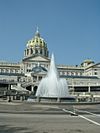 |
501 North 3rd Street | 272 ft (83 m) | 5 | 1906 | Where the state's laws are made and the governor works. |
| Rachel Carson State Office Building | 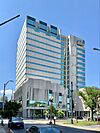 |
400 Market Street | 230 ft (70 m) | 17 | 1990 | Named after famous environmentalist Rachel Carson. Houses departments for nature and environment. |
| Labor and Industry Building | 651 Boas Street | 219 ft (67 m) | 18 | 1955 | Home to the Department of Labor and Industry. | |
| Governor's Residence |  |
2035 North Front Street | 2 and a half | 1968 | The official home of the governor of Pennsylvania. | |
| Health and Welfare Building |  |
625 Forster Street | 143 ft (44 m) | 11 | 1955 | Contains departments for health and public welfare. |
| Matthew Ryan Legislative Office Building | 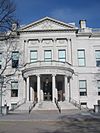 |
Next to the Capitol Building | unknown | 2 | 1893 | Has offices for members of the Pennsylvania House of Representatives. |
| Commonwealth Keystone Building |  |
400 North Street | unknown | 10 | 2001 | Houses offices for the Department of Transportation and other state groups. |
| K. Leroy Irvis Office Building |  |
450 Commonwealth Avenue | unknown | 7 | 1921 | Named after a former Speaker of the Pennsylvania House. |
| North Office Building |  |
401 North Street | unknown | 7 | 1928 | An important office building in the complex. |
| Northwest Office Building |  |
Capital and Forster Streets | unknown | 7 | 1939 | Contains the Pennsylvania Liquor Control Board. |
| Forum Building |  |
607 South Drive | unknown | 6 | 1931 | Home to the State Library of Pennsylvania. |
| Finance Building |  |
613 North Street | unknown | 5 | 1939 | Houses the Department of Finance. |
| Pennsylvania Judicial Center |  |
601 Commonwealth Avenue | unknown | 9 | 2010 | Contains the Pennsylvania Commonwealth Court. |
| Pennsylvania State Archives |  |
350 North Street | unknown | 20 | 1964 | Stores important historical documents for the state. |
| State Museum of Pennsylvania |  |
North 3rd and North Streets | unknown | 5 | 1964 | A museum where you can learn about Pennsylvania's history and culture. |
| Strawberry Square |  |
303 Walnut Street | 204 ft (62 m) | 16 | 1980 | Has state offices and other businesses. |
| Forum Place | 555 Walnut Street | unknown | 9 | 1996 | Houses the Office of Budget and Social Security. | |
| 333 Market Street Tower | 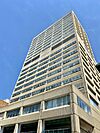 |
333 Market Street | 341 ft (104 m) | 22 | 1978 | Houses the Pennsylvania Department of Education. It's the tallest building in Harrisburg! |
History of the Complex
Harrisburg has been the center of Pennsylvania's government since 1822. That's when the first capitol building was opened.
Early Buildings and Fires
Work on what is now the Ryan Office Building started in 1893. The first capitol building sadly burned down in 1897. A new one was started, but people didn't like its design, so work stopped in 1899. The beautiful capitol building we see today was started in 1902 and finished in 1906.
Planning the Complex
In the 1910s, the state needed more space for its growing government. They bought the area known as the Eighth Ward. A famous designer named Arnold Brunner was chosen to create a master plan for this space. He used the "City Beautiful" ideas to design a grand layout. Even though he passed away in 1925, much of his vision was eventually built.
One part of his plan was an open area called the "People's Forecourt." This space was meant to connect the Capitol and other buildings visually. For a while, it was used as a parking lot. Later, the East Wing was built there, which also helped connect the buildings in a new way.
Historic Recognition
The Capitol building was added to the National Register of Historic Places in 1977. It was then named a National Historic Landmark in 2006. This special recognition was expanded in 2013 to include the entire complex south of North Street. This means the whole area is considered very important for its history and design.
See also
- List of National Historic Landmarks in Pennsylvania
- National Register of Historic Places listings in Dauphin County, Pennsylvania
- List of state and county courthouses in Pennsylvania
 | Shirley Ann Jackson |
 | Garett Morgan |
 | J. Ernest Wilkins Jr. |
 | Elijah McCoy |




